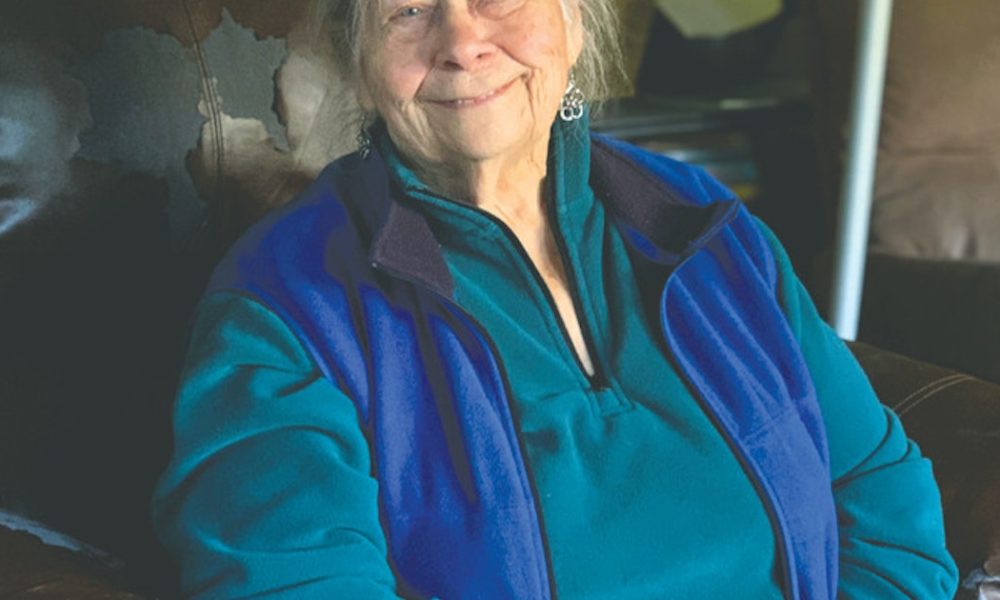 Shari Reyna is co-owner of Ferns’ Edge Dairy in Lowell. The farmstead has been in business for almost 50 years. Aliya Hall/The Chronicle
Shari Reyna is co-owner of Ferns’ Edge Dairy in Lowell. The farmstead has been in business for almost 50 years. Aliya Hall/The Chronicle
LOWELL – It’s not easy being a farmstead dairy in 2019. Shari Reyna, co-owner of Ferns’ Edge Dairy in Lowell, has been in the business for almost 50 years with her partner and they have never paid themselves a dime.
”Most readers would say we’re crazy,” she said. ”I don’t think we’re crazy … we felt it was worth doing.”
Ferns’ Edge Dairy is a dairy goat farm that produces milk and cheese directly on the farm. The dairy has over 30 different varieties and flavors of cheese, and is the only Oregon dairy to be Grade A certified to sell raw goat’s milk to stores.
Originally, Reyna wasn’t planning on running a goat dairy. She was working as an anthropologist when her son and daughter-in-law decided they wanted to open a dairy, but the two divorced after he was diagnosed with bipolar disorder, and the family was stuck with money they had borrowed from the bank.
”We didn’t know what to do,” she said. ”We didn’t intend on doing this but we had the goats, permits and money for the dairy.”
The dairy sits on 20 acres with a view of Mt. Zion from the pasture. Reyna milks around 100 goats, and has 50 that are either dry or babies. It’s a small operation with three full-time employees in the milking parlor and cheese room and four part-time employees that will either help with milking or at farmers’ markets. Reyna manages the farm, makes deliveries to Portland and handles the bookkeeping.
The goats are milked from 9 a.m. to noon and the milk is put in the tank at 40 degrees. In the afternoon it’s pumped over to the cheese room, where the cheesemaker will make fresh, soft chèvre that will be sent out to stores that week. The harder cheese has to be aged for 60 days before it can be sent to stores.
To keep the goat cheese from tasting ”goaty,” Reyna keeps the bucks far away from the milking parlor and doesn’t allow her employees to smoke or wear perfume because it could pick up those fragrances.
She added that having everything done on the property reduces the number of times the milk is disturbed with pumping. In goat’s milk, the fat globules are much smaller than that of cow’s milk, which makes the milk more digestible but also means the globule skin can be easily ruptured; that rupture causes the methyloctanoic acid in the milk to release that ”goat taste.”
”What we make is not commercial, it’s done by hand,” Reyna explained. ”The quality is way better, but being labor-intensive costs more. Part of the problem is educational; people have to realize we’re selling it as low as we can sell it.”
Although there are financial challenges – by selling raw milk they have to pay for extra liability insurance that costs an added $600 to $700 a year – Reyna is concerned about what closing down the farmstead would mean.
”Every time we think we’re done there’s people being, ‘Oh, what are we going to do?’” She said. One woman reached out to her saying that her autistic grandson will only drink their raw milk.
She also added that if their raw milk license expires, she believes the Oregon Department of Agriculture will remove the loophole that made it possible for her business to sell raw milk.
While a farmstead dairy is not a get-rich-quick scheme, Reyna said that their lifestyle is good for the world. They trade with other farmers for fresh vegetables and ingredients, and try to have a low impact on the environment.
”The upside is, we’re doing a really good thing that is done the right way,” she said. ”Doing it the right way in this world is literally swimming upstream against an incredibly strong current.”








